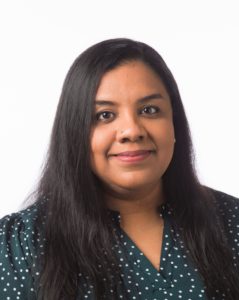Exploring the stories of epidemiology to find public health solutions
September 29, 2022 • News

Working in epidemiology is like solving a puzzle or telling a story. Epidemiologists are often called “disease detectives,” using research, analysis and communication to investigate the causes of a public health concern and look for solutions.
Dr. Malinee Neelamegam, assistant professor at The University of North Texas Health Science Center at Fort Worth School of Public Health (SPH), is an epidemiologist who mentors aspiring epidemiologists and future public health professionals.
She is in her second year as SPH faculty this fall. Her career has taken her around the world – from Malaysia, where she was born and completed her undergraduate degree in biomedical sciences, to Australia, different parts of the U.S. and, most recently, to North Texas.
Her work has always been community-based.
The first five years of her career were focused on clinical trials in the pharmaceutical industry. She later served as a research officer for the National Institutes of Health, Ministry of Health, in Malaysia.
Dr. Neelamegam has been a visiting scholar at the Centre for Excellence for Research in AIDS at the University of Malaysia and was program coordinator for the NIH-funded Malaysian Implementation Science Training in HIV program through Yale University and the University of Malaysia.
“After working in the pharmaceutical field, I found that academia was more where I wanted to be,” she said. “This brought me back to school for my MPH and PhD degrees.”
Dr. Neelamegam moved to the U.S. for graduate school as a Fulbright grantee, attending the University of South Florida (USF) and then accepting an NIH-funded postdoctoral fellowship with the Yale School of Public Health.
While at USF, she met her husband, an infectious disease physician who is currently working on COVID-related issues, as well as several HSC School of Public Health faculty who were studying in Florida at the same time, including Drs. Erika Thompson, Stacey Griner, Nolan Kline and Charlotte Noble.
Dr. Neelamegam worked in Australia for her PhD dissertation and returned to Malaysia for the data collection on her Yale postdoctoral project, studying older adults living with HIV. During the height of the pandemic, she remained in Malaysia to work on COVID-19 projects.
As an epidemiologist, her goal is to identify the risk factors for the spread of diseases and tell a story through data that helps lead researchers to solutions.
“All data has a story, and it’s an epidemiologist’s job to tell it,” she said. “Telling that story in a reliable, trustworthy way is key, especially in light of the misinformation overload we’ve been bombarded with during the last two years of the pandemic.”
“In a time when misinformation can be communicated so well and so easily, it’s crucial for disease experts to connect with our audiences in science-based, believable, easily-understood language. Knowing our science is one thing – being able to convey that science to communities in real-world terms is another – and I work hard to instill that idea with our students,” she explained.
To that end, Dr. Neelamegam recently created a new SPH course for MS and PhD students on practical applications in epidemiology.
“We learn theory and methodological practices in classes, but how we translate this for community partners and populations at special risk makes a difference,” she noted.
She advises students to listen first as they work in partnership with communities on important public health issues.
“One reason I was so interested in joining HSC is because of our strong community partnerships,” she said. “We place emphasis on serving populations affected by health disparities.”
Dr. Neelamegam’s research is focused on understanding aging in populations that face health disparities. Her special interests include aging in people living with HIV, healthy aging in minority populations, end-of-life planning and dignity in death, and aging issues among foreign-born populations living in different countries.
“Texas has the third highest population of South Asians in the U.S. As a South Asian diaspora myself, healthy aging among this population is of special interest to me,” she explained.
“I tell our students, if we are lucky, not all of us may experience heart disease, cancer, maternal/child health issues, or other conditions, but we all age and most likely will become older adults. Modern medical and public health advances have done much to change the trajectory, so people can live healthier well into their older years,” she said.
“Our job in public health and the health professions,” she said, “is to provide the resources and support to meet their needs as they change over time.”
Dr. Neelamegam is also a strong advocate for working mothers. As the mom of a preschool-age son, she understands the challenges of juggling career and caregiving, especially during the COVID pandemic.
Moving to North Texas in 2021 has been a positive experience, she said, where she has been able to connect family, teaching, research and community with friendships, resources and public health collaborations.
“There is a strong sense of togetherness at SPH, HSC and within the local community – there is much to like here, with so many opportunities still to explore,” she said.

Social media